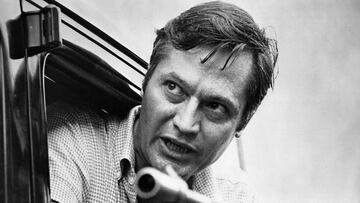Legendary filmmaker Roger Corman dies at 98
The ‘King of B Movies’ was a mentor to directors such as Francis Ford Coppola and Martin Scorsese and actors like Jack Nicholson and Robert De Niro.

In art, as in life, there must always be a brave man, sometimes or rather almost always a scoundrel, who opens the door so that other generations can find their way. Roger Corman has been many things in the film industry, but above all, above any formal and biographical description, he was a man who changed Hollywood forever. The man who gave a start to so many great directors and actors has closed his eyes for the last time on May 9 at his home in Santa Monica, California.
In the mid-50s Corman did something that was new, perhaps even revolutionary for the time. It was a decade where the thriller reigned and the western enjoyed its golden years, where cinematic war turned its gaze toward the consequences of past conflict, where historical drama bathed in this shimmering pool and animation enjoyed its first truly great era. Science fiction and rock and roll were outsiders, peeking through a very small gap in the wall. Everything became mixed in the mind of Corman, who knew how to make B-cinema, on exceedingly low budgets, flying a countercultural banner, with a predilection for terror, and writing what would come to be known as New Hollywood.
He made his ideas an artistic cause in the 60s and allowed a generation of intrepid young people to get their start in cinema, a young generation who understood the creative essence of independent cinema. Corman was their ‘spiritual leader’, the mentor, the teacher. Under his wing directors such as Steven Spielberg, Francis Ford Coppola, Martin Scorsese, Peter Bogdanovich and James Cameron began their careers and actors of the caliber of Jack Nicholson, Peter Fonda and Robert De Niro.
“I was a filmmaker, just that”
With his departure from this earth, one of the visionary souls that fed the hidden heart of Hollywood disappears; a man who lived through and for cinema, faithful to its style and its convictions right up until the last of his days. Behind Corman are over five hundred films that shine brightly in the mind of the nostalgic fans, unable to forget his adaptations of Edgar Allan Poe that gave us the genius of Vincent Price, many of which were only fully appreciated decades later. In 2009, the Hollywood establishment that he rebelled against bestowed upon Corman an Honorary Oscar.
A guy from Detroit who studied Industrial Engineering, Roger Corman served in the Navy and fought in World War II, but he knew from the very beginning that he was in love with cinema. Getting a job as a messenger boy at 20th Century Fox, Corman later became a script analyst before jumping into the world of literature, bringing high art to the low-brow drive-in.
Roger Corman, one of the most influential movie directors in my life, has passed away. It was my privilege to know him.He was a great friend. He shaped my childhood with science fiction movies and Edgar Allen Poe epics. I'll miss you, Roger.
— John Carpenter (@TheHorrorMaster) May 12, 2024
Related stories
Only Roger Corman could turn this seemingly mundane career into the gatekeeper for Hollywood, offering generations of new directors a break and enriching all our lives in the process. That career is today celebrated, probably through tears, by all those who considered him a role model: from Quentin Tarantino to John Carpenter, who posted to Twitter: “Roger Corman, one of the most influential movie directors in my life, has passed away. It was my privilege to know him.He was a great friend. He shaped my childhood with science fiction movies and Edgar Allen Poe epics. I’ll miss you, Roger.”
Roger Corman’s passing was announced by his daughter Catherine Corman, through a statement issued by the Associated Press, which is, in turn, the chest that contains her last will. “He was generous, open-hearted and kind to all who knew him. When we asked him how he would like to be remembered, he said: ‘I was a filmmaker, that’s all.’”


Complete your personal details to comment